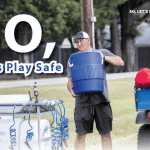The Importance of Sleep and Recovery to Athletic Performance
Many athletes would say they “eat, sleep, and breathe” their sport, however many also neglect one of those very important components, sleep! The amount and quality of sleep an athlete gets can be the difference between a good training session and a poor one, a win or a loss, just based on the slightest decline in split-second decision making and concentration. Lack of sleep can also lead to mood disturbance, learning, cognition, and decreased immune function.
The average adult requires 7-9 hours of sleep a night, where most adolescent athletes require a minimum of 9 hours of sleep. A study done on basketball players showed that getting an increased amount of sleep lead to faster sprint times, and increased accuracy on free throws. Their moods were significantly increased, and their fatigue was decreased. Adolescents face other distractions from sleep that can also harm them, including technology screens, social distractions, and academic stress. This typically results in more sleep on weekends, and less during the weeks. Establishing a scheduled sleep and wake time can improve the sleep and recovery patterns for adolescent athletes.
Exercise depletes energy, increases dehydration, and causes muscle breakdown. Having proper nutrition and hydration is only one piece of the puzzle to repair muscle and regain energy. What you do at night, prior to and following athletic activity, determines how well your body can rebuild muscle and restore energy. Research suggests that sleep deprivation can cause a decrease in the production of glycogen and storage of carbohydrates, which are used for energy during physical performance. Protein synthesis can also be hampered by a lack of adequate sleep, which will decrease the ability to repair and rebuild muscle. These things combined can lead to increased fatigue and low energy, which may produce consequences at game time.
Proper sleep can lead to increased speed, endurance, accuracy, and overall performance. Recognizing barriers to getting proper sleep and following recommended sleep guidelines can help athletes improve their performance in all areas of their lives, not just athletically.
· Decreased sleep quality and quantity can decrease performance
· Adolescents require a minimum of 9 hours of sleep each night
· To create optimum sleep, follow an established sleep routine
· Implement a “wind-down” routine, including no screen time, reading and stretching or meditation
· With proper sleep, you’ll be faster, increase strength and endurance, and boost coordination and reaction time
Blog information from: Megan Mercer MS, LAT, ATC – Walnut Grove HS in Loganville, GA






